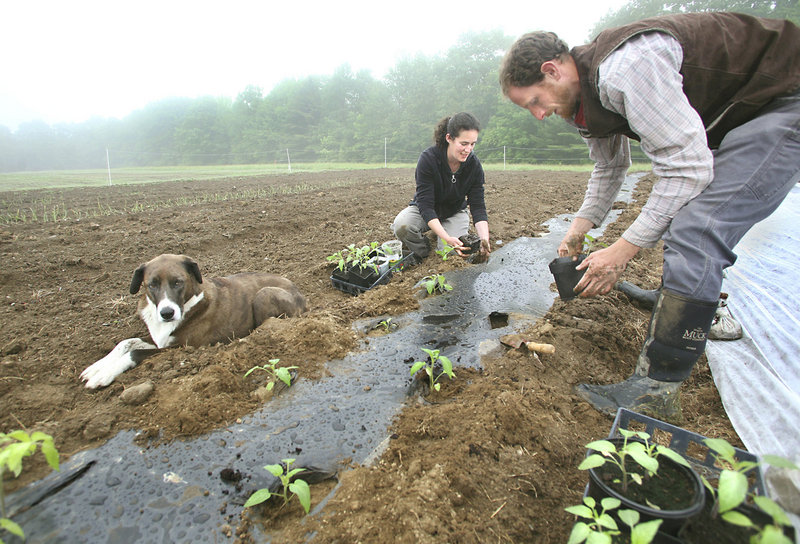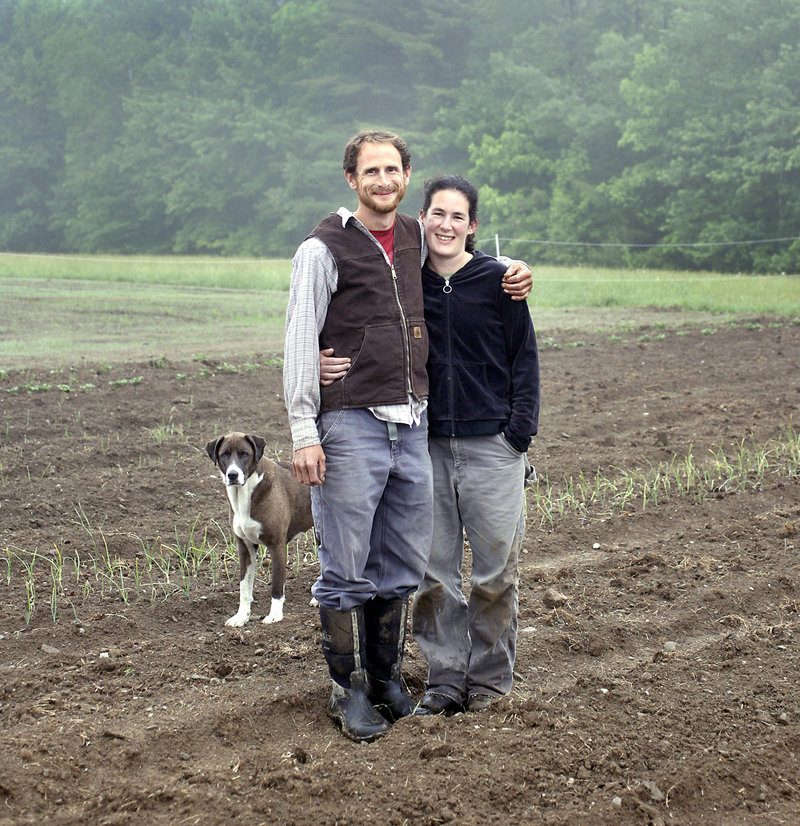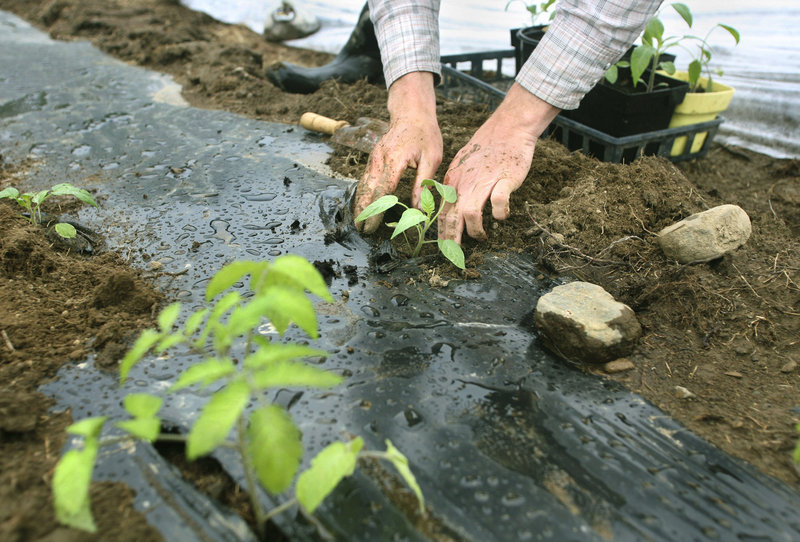WASHINGTON – Julia Davis and her fiance, Andy McLeod, surveyed their 7,500-square-foot garden in a peaceful meadow, pointing out where they’ve planted potatoes, squash, cucumbers and onions that are now shooting out of the fine sandy loam like strands of hair on a balding man’s head.
“Some days it looks big, some days it looks tiny,” McLeod, 34, said of the garden.
“The days we weed, it looks bigger,” added Davis, who is 30.
McLeod and Davis resemble any other young couple trying their hand at gardening, but few others have attempted what they are trying to do here on a loaned plot of land in central Maine.
This is their wedding garden.
Davis and McLeod are growing virtually all of the food that will be served at their Sept. 25 wedding. And they have enlisted family and friends to join them in the kitchen on Sept. 24 to transform their harvest into a delicious wedding dinner.
Davis is writing a blog about the experience called “A Local Food Wedding, From Seed to Plate.”
Lots of people preach tirelessly (and sometimes tiresomely) these days about the idea of local, organic, sustainable food production, but this couple is putting their rhetoric where their mouth is. They are even planning to raise their own chickens, which are expected to arrive July 1 and in September will be served roasted with squash soup, oven fries and cubed Hubbard squash with kale.
Some observers will invariably think they are crazy — does a bride really need any more stress as her wedding day approaches? Others will admire the guts it takes to throw planting and weeding and watching the weather into the long mix of chores that have to be done before one of the most important days of your life.
“That’s incredible,” said Anja Winnika, editor at TheKnot.com, when she heard about the Maine couple’s plans. Winnika said serving local, organically grown foods at wedding dinners is a huge trend this year, but she has never heard of anything quite this local. (Davis herself could find only one other couple, somewhere in the Midwest, growing their own wedding food.)
Food has taken a front seat at weddings, Winnika said. Catering companies now offer 100-mile meals, and food-centric couples are making their own jams, pickles and herb-infused oils to give as wedding favors.
“But I’ve never actually heard of growing all their own food and then making it and serving it,” Winnika said. “That takes it to a new level.”
COMMON DENOMINATORS
Davis, who works for the Damariscotta Lake Watershed Association, and McLeod, who works for the Medomak Camp where the garden is located, met through a family friend about four years ago and became engaged last Halloween.
They knew they were meant to be together early on in the relationship. Both share similar philosophies of life and food, factors that played a role in starting their own wedding garden.
They both like knowing where their food comes from and being connected to that, and they wanted to save money.
“But then we also really just like providing for our own needs,” Davis said. “We make our own maple syrup and we brew our own beer and we’ve smoked our own bacon. We cut our own wood. We’re not the kind of people who just sort of sit around. We like to be active and doing things, so we thought this would be a good project for the summer.”
It’s also something of an experiment. Davis and McLeod are looking for their own land where they can start a small organic farm after they are married, so they are keeping detailed records of their wedding garden to learn from their successes and failures.
“We’re keeping track of how much we’re planting,” Davis said, “and we’re going to keep track of how many pounds we get out of the number of plants or the number of rows that we plant of each crop.”
Based on an estimate of 100 guests, the couple used a spread sheet and examined yield estimates from seed catalogues to figure out how much food to grow. They’ll plant more than they actually need to cover their bases, and hope to have some food left over to keep or sell. There will be, among other things, 27 pounds of butternut squash, 40 pounds of potatoes, 12 pounds of cabbage and 15 pounds of carrots.
Fertilized with goat manure scavenged from a nearby goat farm, the ground has already been planted with onions, potatoes, pumpkins, butternut and Blue Ballet hubbard squash, beets, carrots, corn, dill, lettuce, at least five different kinds of tomatoes and lots of cucumbers.
“I really like pickles,” Davis said. “That’s why we’re growing so many cucumbers. I have this recipe from my Jewish great-grandmother for half-sour dill pickles.”
In trays, waiting to be planted, are watermelon, cantaloupe, broccoli, kale, cauliflower, brussel sprouts, basil, dill, sweet and hot peppers, and more tomatoes.
Some foods will be directly seeded into the garden — green beans, more cucumbers, peas, turnips, more beets and carrots, cilantro, two kinds of cabbage for slaw, and more lettuce that will be planted closer to the wedding date.
“We’ll be disappointed if things fail on us, but that’s sort of farming,” Davis said. “We definitely learned that lesson last year, when we were working for this farm across the street and it was a bad year. And even though it wasn’t our farm, it was still disappointing to put our work into it and see things fail.”
NO MANGOS OR AVOCADOS
They’re open to buying food from a local farmer if part of their crop fails, and they will be purchasing ingredients such as olive oil, spices, cheese and bread and other things they can’t grow or make themselves.
“But we didn’t plan anything with mangos or avocados,” McLeod said.
Both former vegetarians, Davis and McLeod built their own chicken tractor to move their 50 Freedom Ranger chickens around the pasture so they’ll always have fresh grass and insects.
The chickens will likely be one of the more expensive parts of the project. The couple budgeted $250 for the chicks and for slaughtering, but still have to pay for feed. They haven’t decided yet if they’ll use organic feed, since it costs about twice as much as non-organic.
Davis is keeping detailed records of expenses, from the $94 they spent on Johnny’s Selected Seeds down to the $3 they spent on screws at Marden’s when they were building the chicken tractor. So far, they have spent $385 growing vegetables.
The budget for the entire wedding is $6,600. About $1,000 to $1,500 of that has been earmarked for food.
Compare that with the $16,626, including site rental fees, that the average Maine couple spends on their wedding reception, according to a nationwide survey of more than 20,000 couples that TheKnot.com and WeddingChannel.com conducted last year. (The national average is $12,838.)
Diane York, a Portland wedding planner, says the average Maine couple with 120 wedding guests will spend $8,000 to $10,000 on food and alcohol.
Those tabs include the cost of labor. Davis and McLeod’s staff will be friends and family, which fits right in with the casual and low-key affair they are planning. Instead of a church or fancy private venue, they’ve rented out a camp on the shores of a central Maine lake so that guests can stay the weekend if they like.
The wedding itself will be by the lake, where the family friend who introduced them will marry them in a Quaker-style ceremony. Davis has already bought her wedding dress at Macy’s (a long, sleeveless mocha-colored dress embossed with flowers, not a formal white gown), and her bridesmaids “can wear anything they want.”
Instead of a wedding cake, they’ll have pies baked by their mothers and ice cream from John’s Ice Cream Factory in Liberty. Davis’ parents, Jane and Stan Davis of Wayne, are growing gourds and flowers (sunflowers, globe amaranth, statice and strawflowers) for decorations.
Appropriately enough, the wedding falls on Common Ground Fair weekend, a popular annual gathering of organic farmers and gardeners.
Davis says the wedding garden is helping her and her fiance learn how to work together and develop the skills they’ll need to have a lasting marriage.
“It’s kind of a stress to have to make these decisions together,” she said. “I find it especially hard to make decisions together when neither of us know for sure the right decision to make, so we’re both sort of guessing at it. Eventually, we need to go with one of our guesses, and that’s hard to do. It can be a little bit stressful sometimes, but that’s going to be what our whole lives are going to be like if we have a farm together.”
Jane Davis put it this way in a guest entry on her daughter’s blog:
“May their marriage grow easily in any soil, tolerate dry weather and some frost, bloom prolifically, and be everlasting.”
Staff Writer Meredith Goad can be contacted at 791-6332 or at:
mgoad@pressherald.com
Send questions/comments to the editors.






Success. Please wait for the page to reload. If the page does not reload within 5 seconds, please refresh the page.
Enter your email and password to access comments.
Hi, to comment on stories you must . This profile is in addition to your subscription and website login.
Already have a commenting profile? .
Invalid username/password.
Please check your email to confirm and complete your registration.
Only subscribers are eligible to post comments. Please subscribe or login first for digital access. Here’s why.
Use the form below to reset your password. When you've submitted your account email, we will send an email with a reset code.